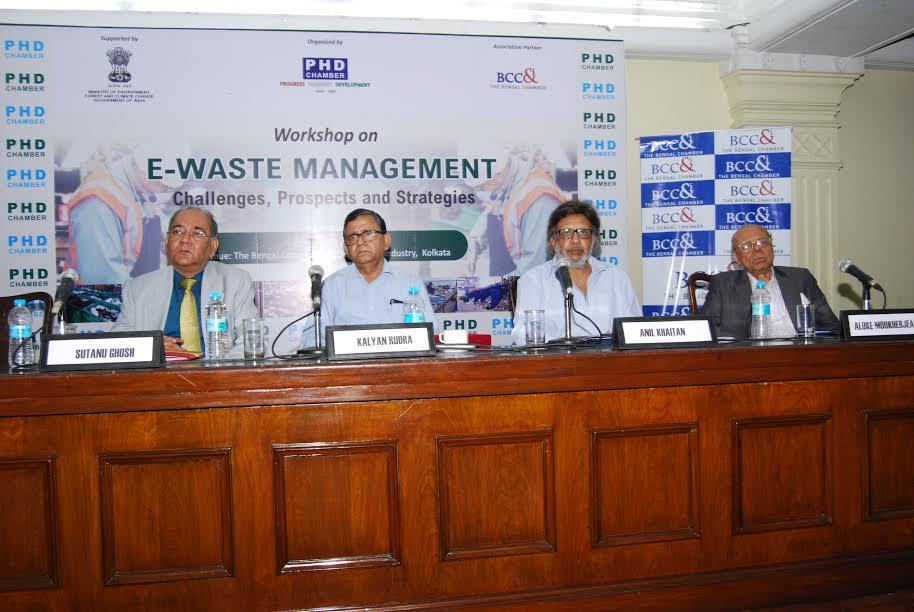 image
image
Kolkata: Bengal Chamber and others mull over strategies for e-waste management
#EWaste
# HazardousEWaste
# EWasteDisposal
# EWasteManagement
# BengalChamberofCommerceandIndustry
#
Kolkata, May 30 (IBNS): The increased use of electronic appliances is resulting in a lot of e-waste, whose cumbersome and hazardous disposal requires intensive management, was the general consensus at the E-Waste Management seminar organised by the Bengal Chamber of Commerce and Industry in association with PHD (Progress Harmony Development) Chamber and the Union Ministry of Environment, Forest & Climate Change.
Organised in Kolkata, on Monday, the overall objective of 'E- Waste Management - Challenges, Prospects and Strategies & Hazardous Waste Management' was to provide an insight into various aspects of e-waste management with respect to the current situation and future scenario.
The agenda focused on the E-waste Management Rules set in 2016, regulatory compliance including roles and responsibility of the stake holders, Extended Producer Responsibility (EPR), role of informal sector in e-waste management, e-waste scenarios, opportunities and road map, sustainable E-waste management and perspectives of manufacturers, recyclers, etc.
.jpg)
Dr. Kalyan Rudra (Chairman, West Bengal Pollution Control Board), Anil Khaitan (Sr. Vice President, PHD Chamber of Commerce), Sutanu Ghosh (President, The Bengal Chamber), Dr. Subrata Mukherjee (I.F.S, Member Secretary, West Bengal Pollution Control Board), Kanchana Zutshi (Secretary, Environment Committee, PHD Chambers), Aloke Mookherjea (Past President, The Bengal Chamber) were present at the meet.
Dr Kalyan Rudra said, “India, produces around 1.7 million tonnes of e- waste annually resulting creating severe pressure on space and money to dispose these waste."
He said that the Pollution Control Board and the state government are conducting workshops to train the workers in building waste management skills and also in creating awareness among the people.
West Bengal has two e-waste management plants, one in Hooghly and the other in South 24 Parganas but more need to be pressed into service, he said.
Dr Rudra said, "It is the duty and responsibility of the manufacturers, producers, e-waste collectors, dealers, consumers and dismantlers to follow the guidelines provided by the Pollution Control Board to collect the E-waste, dismantle them an properly channelize them for a pre-treatment and disposal.”
India is said to be the fifth largest producer of e-waste.
.jpg)
“To combat this e-waste problem, we need to create proper infrastructure for collection, storage, transport, recovery, disposal for national and regional for environment sound management of the places," said Anil Khaitan.
According to Sutanu Ghosh, “In India, 1.7 million tonnes of E-waste are generated every year, with an annual increase of five percent. The E-waste (Management) Rules 2016 notification, which supersedes the e-waste (Management & Handling) Rules, 2011 provides several options to manufacturers – such as collection of a refundable deposit and paying for the return of goods – to meet the requirements of law. The role of state government has been also introduced to ensure safety, health and skill development of the workers involved in dismantling and recycling operations.”
Top Headlines
-
News
Ali Khamenei (19392026): Irans Supreme Leader who ruled with an iron grip
March 01, 2026
-
News
Ali Khamenei (19392026): Irans Supreme Leader who ruled with an iron grip
March 01, 2026
-
News
Ayatollah Ali Khamenei killed in US-Israeli Air Strikes; Irans Revolutionary Guards vow sweeping retaliation
March 01, 2026
-
News
PM Modi expresses displeasure over NCERT judiciary chapter, wants accountability fixed
February 26, 2026
-
News
Former New Zealand PM Jacinda Ardern to relocate to Australia amid growing Kiwi exodus
February 26, 2026
-
News
Major aviation boost for Kashmir: Cabinet clears development of a new Civil Enclave at Srinagar International Airport
February 24, 2026
-
News
India urges all nationals to leave Iran 'by available means' as US-Iran tension grows
February 23, 2026
-
News
Ind.AI: Sovereignty, jobs, energy and the What If?
February 20, 2026
-
News
From car diplomacy to global strategy: Modi, Macron upgrade IndiaFrance ties
February 17, 2026
-
News
Seva Teerth: PM Modi inaugurates new PMO, announces these key decisions on first day
February 13, 2026





